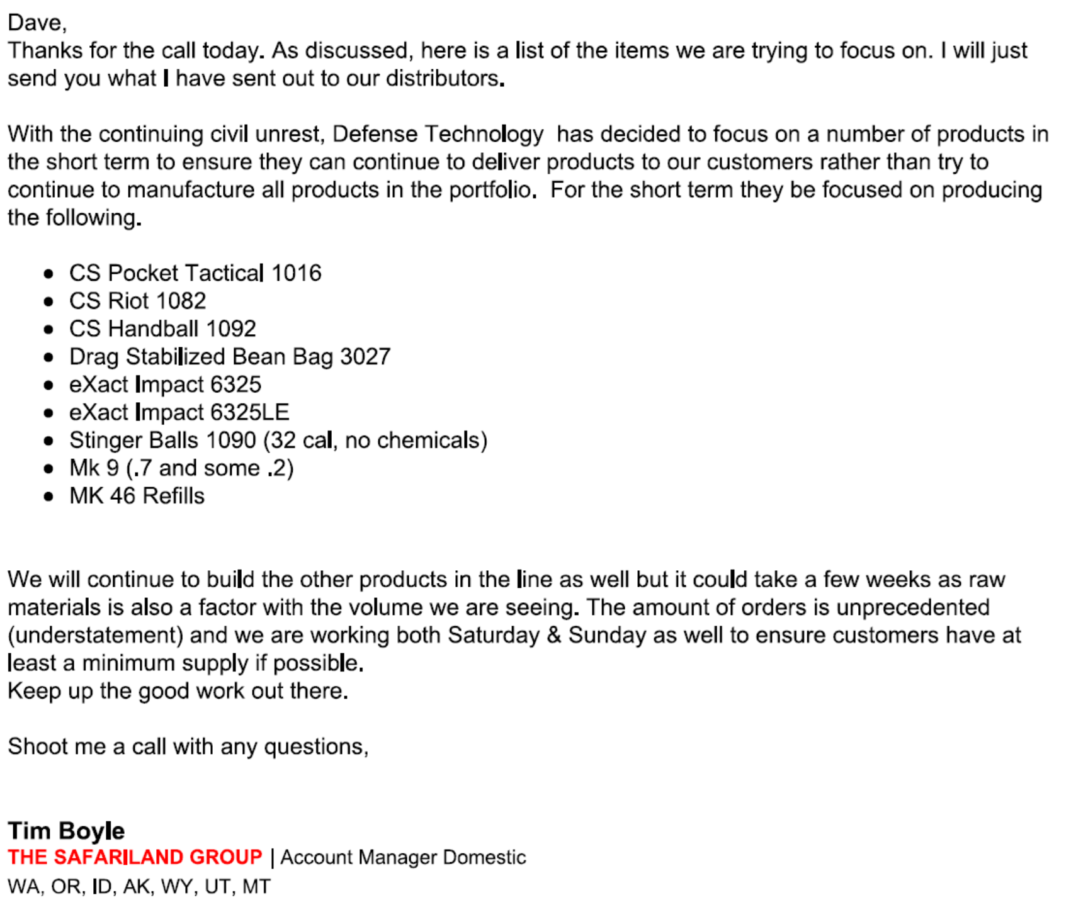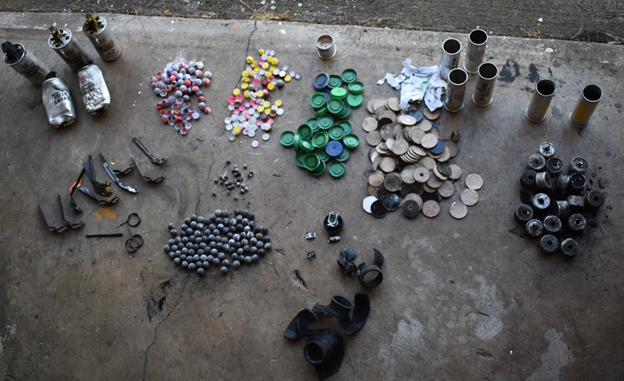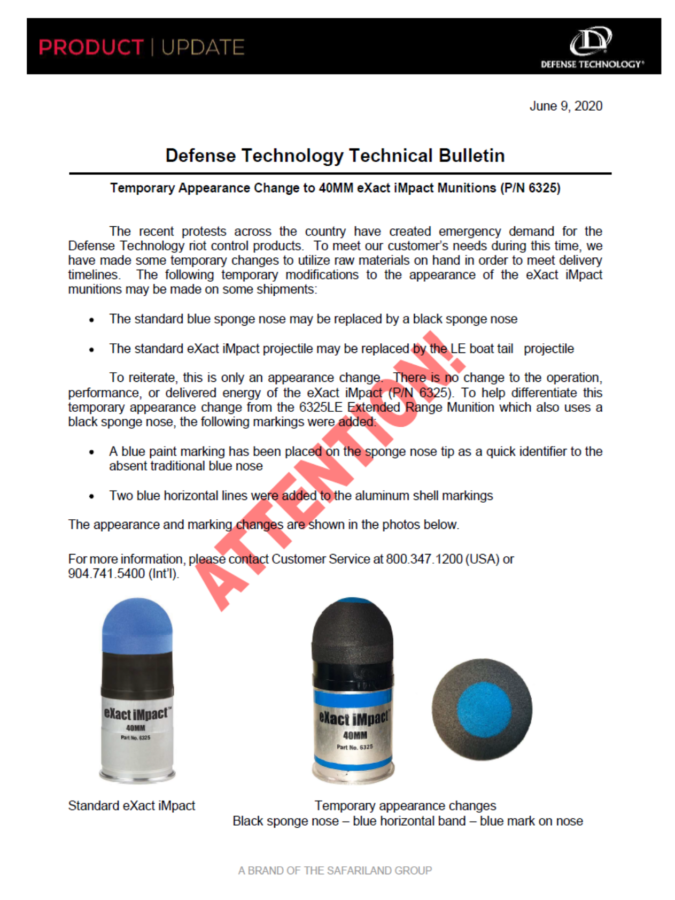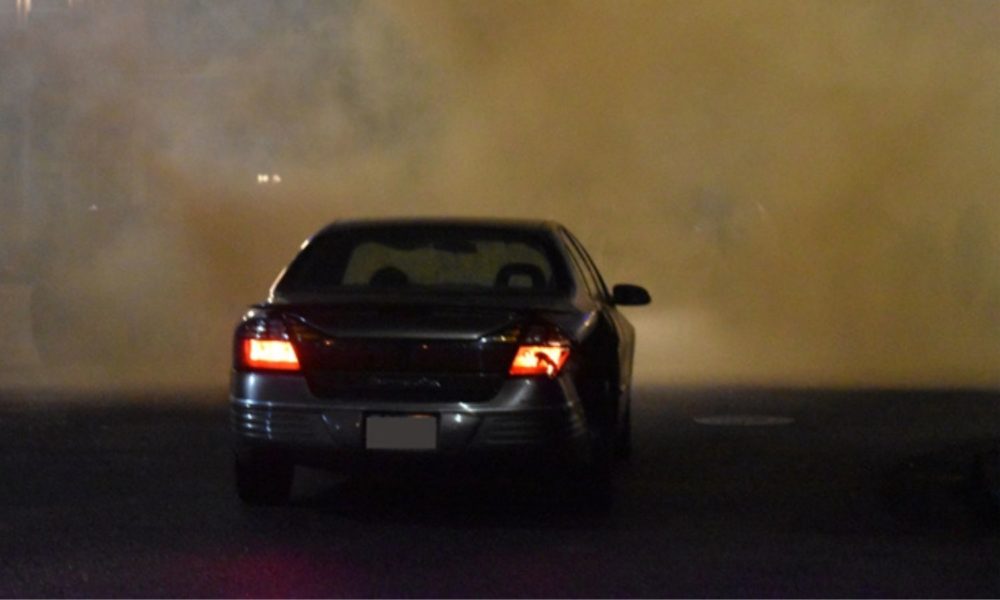In early June 2021, following a year of extensive use of chemical weapons (such as tear gas) by law enforcement against racial justice protesters, the U.S. House of Representatives Oversight Subcommittees launched an investigation into the safety of these weapons, requesting internal documents and product information from manufacturers.
Despite the well-documented human health impacts of Safariland’s products, there is little to no oversight of these companies that would ensure safety for workers or victims of their weapons. As a result, the subcommittees must rely heavily on information provided by the companies themselves.
The critical question is then: how trustworthy are these manufacturers?
Safariland is the largest of the three companies targeted, with annual sales ($864 million) more than three times the combined sales of the other two (Pacem: $227 million; Combined Systems, Inc.: $50 million), and an outsized market presence that has generated scrutiny. Safariland has tried to avoid public visibility through the use of subsidiaries, but it all caught up with them when national news outlets published that Safariland’s chemical weapons were used on protesters in front of the White House on June 1. The day after this revelation (June 9), the company put out a press release stating they were exiting the chemical weapons industry.
Some major media outlets appear to have taken this statement of divestiture at face value and continue to report it a year later. The evidence, however, points to a different story: that Safariland has not only remained in the chemical weapons industry but is seeing “unprecedented” levels of business.

What is Safariland?
Safariland was founded as a gun holster company in the mid-1960s by Neale Perkins, who headed the organization until its purchase in 1996 by chemical weapons mogul Warren Kanders. Kanders used his corporate vehicle Kanders Florida Holdings, Inc. to buy the company, and then re-organized it under his new Armor Holdings, Inc., which he incorporated in Delaware under registered agents The Corporation Trust Company—a common tactic for individuals to keep their names off of corporate documents.
The following year, Kanders incorporated a new Safariland LLC, which is the Safariland—an active corporate entity with 33 branches across the US that owns patents and trademarks of its many subsidiaries. Over the 25 years that followed, Safariland (via Armor Holdings and other purchasing vehicles) subsumed chemical weapons manufacturers Smith & Wesson Chemical Company, Lake Erie Chemical Company, MACE, Federal Laboratories, and Defense Technology—the last one used as the brand subsidiary by Safariland for chemical agents and other so-called “less lethal” weapons.
This means you’re unlikely to see overtly Safariland-branded tear gas, but don’t be fooled: Defense Technology tear gas is brought to you by Safariland. The ploy is aided by Safariland LLC and Defense Technology being established in Delaware via The Corporation Trust Company, just like Armor Holdings and Maui Acquisition Corp., the entity Kanders now uses to manage Safariland.

These acquisitions not only gave Safariland a substantial share of the chemical weapons market without being tied to it by name, but also key business connections, some of which stretch back to the end of World War I and the privatization of the US Army’s Chemical Warfare Service. As a result, Safariland’s Defense Technology has become a major producer of chemical weapons for the US military and domestic police. Here in Portland, Oregon, Defense Technology has been the dominant brand of chemical grenades and shot-shells used by local and federal law enforcement agencies during the 2020-2021 protests.

Far from just a domestic company, Safariland also exports chemical weapons to police and militaries abroad, taking advantage of the Foreign Trade Zone (FTZ) in Defense Technology’s hometown Casper, Wyoming. The FTZ allows the import of raw chemicals and export of finished weapons without any customs. The FTZ was established in 1989, just a few years before Defense Technology moved to Casper and was acquired by Safariland. With Safariland’s support over nearly three decades, Defense Technology has built an international hub of chemical weapons manufacturing and distribution within a federal tax haven.
Broken promises
It has been more than a year since Safariland’s press release and ten months after their stated deadline for divesting from Defense Technology. At this point, they should be clean and clear from chemical weapons, but the evidence shows that Safariland is still actively running Defense Technology, casting doubt on whether they ever actually planned to divest.
At the time of their press release (during the height of protests after the murder of George Floyd), Safariland was not just the parent of Defense Technology, but heavily involved in day-to-day operations. Indeed, emails uncovered through public records requests indicate that, during the first week of June 2020, Safariland was overseeing record demand for Defense Technology, which had ramped up production to such an extent that they were forced to make “temporary changes to utilize raw materials on hand in order to meet delivery timelines.” A memo detailing the impact of supply chain issues with Defense Technology ( “A Brand of Safariland”) was finalized and emailed out by Safariland representatives on the same date (June 9, 2020) as their press release claiming to be divesting from Defense Technology.

The use of shell companies and proxy agents obfuscates the corporate ownership situation, making it difficult to follow if any aspect of the company was sold and to whom. However, there has been no declaration of finalized divestiture nor any changes in registered agency. The clues that do exist point towards Safariland’s continued ownership of Defense Technology, even to this day.
Other evidence showing a lack of divestiture includes the following:
- Technology still uses the Safariland company contact phone number and customer service system. If you call the number (as of August 4, 2021), one is directed through the Safariland brands, including Defense Technology (“Push #3”) and the Training Academy (“Push # 4”). Either selection directs you to a line with a message welcoming you to Defense Technology, and eventually, you can reach a customer service rep who answers the line in Defense Technology’s name.
- Safariland has continued to register and receive trademarks using the Defense Technology brand and logo, with applications as recent as September 10, 2020, and registrations beginning in 2021. There has been no apparent transfer of related marks to Defense Technology.

- Safariland LLC owns the Defense Technology headquarters property in Casper, Wyoming and currently pays the property taxes, including the full 2020 tax, which they completed in May 2021.
- The Defense Technology Training Academy continues to be logistically supported by the Safariland Training Group and Safariland LLC who, in addition to running the general customer service phone line:
- “will supply all munitions required for the [OC Aerosol and Impact Munitions Instructor] class” in West Deptford, New Jersey on August 10, 2021
- manages the liability and assumes responsibility for instructors trained at the 4-Day Less Lethal ICP Instructor course in Fresno, California starting August 17, 2021
- can “meet the needs of all size agencies” through their Crowd Management Mobile Field Force Instructor course taking place in Murfreesboro, Tennessee in January of 2022.
- Safariland is currently hiring employees located at the Defense Technology headquarters, including:
- Chemical Mixer responsible for “chemical handling and mixing [to] assemble product[s]”
- Customer Service Rep who will “assist officers with … the Training Academy”
- Warehouse Associate needing to “obtain and maintain HAZMAT [hazardous materials] certification”
- Technical Sales Specialist “responsible for the sales … of less lethal products and training with distributors and end users”
It would appear then that Safariland has not divested from Defense Technology and is not on the path to do so anytime soon. Indeed, law enforcement continues to turn to Safariland as the leader in chemical weapons.
A crystalizing display of this fact came when the mayor of Brooklyn Center, Minnesota, and reporters at the Star Tribune (MN) asked the Hennepin County (MN) Sheriff’s office about the tear gas used on families and children after the killing of Daunte Wright in April 2021.
In response, the Sheriff’s Office provided a purchasing catalog from Safariland.
Safariland hasn’t left the tear gas business. They are the tear gas business. They were in 2020, and they are in 2021. Call or write your member of Congress today and tell them to hold Safariland responsible for the human and environmental harms caused by their products—and that you won’t take hollow promises of divestiture in place of accountability.

